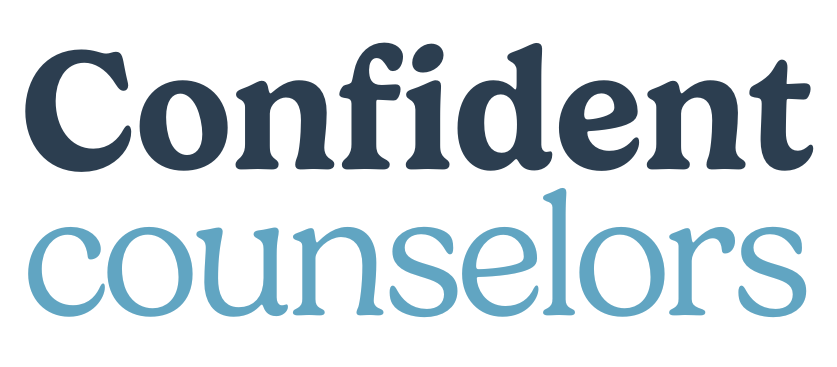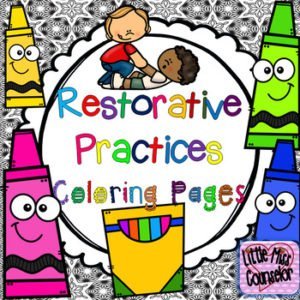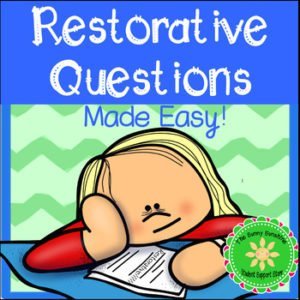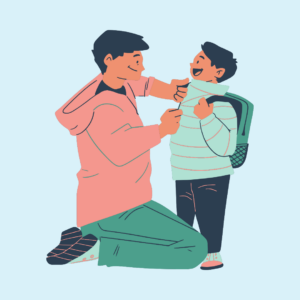Restorative justice is the kind of approach that school counselors should be advocating for in their districts. When implemented well, it has the ability to shift the focus from punishment to repairing and learning from mistakes. How do you get your administrators and teachers on board with this paradigm shift? Even more important, how do you make it a meaningful and effective experience for students?
[su_divider top=”no” style=”double” divider_color=”#af1c1c” link_color=”#000000″] [su_divider top=”no” style=”dashed” divider_color=”#af1c1c” link_color=”#000000″][/su_divider]
Restorative Questions are Key
 Restorative justice practices emphasize the importance of positive relationships and restoring these relationships when harm has occurred. Restorative justice practices decrease behavior issues, discipline referrals and bullying, while increasing in instructional time, school climate, and positive relationships between staff and students.
Restorative justice practices emphasize the importance of positive relationships and restoring these relationships when harm has occurred. Restorative justice practices decrease behavior issues, discipline referrals and bullying, while increasing in instructional time, school climate, and positive relationships between staff and students.
An essential part of using Restorative Practices is the use of restorative questions help to help students learn to reflect on their behavior choices. These questions focus on the incident, and how the choices that the student made affected the student as well as others. Restorative questions help students develop empathy and problem-solving skills while holding them accountable for repairing the consequences of their choices. When thinking of options to help student’s repair harm, I often think of logical consequences. These consequences help students to learn and grow from mistakes. They are logically connected to the student’s behavior choice. Whether it is something that was damaged or someone’s feelings hurt, an individual can attempt to fix it. Possible options for repairing harm: help fix what you damaged, clean up a mess you made, or offer a sincere apology.
– The Sunny Sunshine Student Support Store
[su_divider top=”no” style=”double” divider_color=”#af1c1c” link_color=”#000000″] [su_divider top=”no” style=”dashed” divider_color=”#af1c1c” link_color=”#000000″][/su_divider]
Educator Buy-In
 One thing educators agree about is how we strive for all students to graduate high school. When students are suspended, their risk of dropping out of high school increases. Currently, I am in the process of leading a small group of educators in my district about restorative justice practices. We meet 6 times throughout the year for 2 hours during each session.
One thing educators agree about is how we strive for all students to graduate high school. When students are suspended, their risk of dropping out of high school increases. Currently, I am in the process of leading a small group of educators in my district about restorative justice practices. We meet 6 times throughout the year for 2 hours during each session.
Getting educator buy-in during implementation is essential for restorative discipline to be used and used effectively. I started off by giving each person a teacher discipline style quiz to be used as a baseline before the training began. We will take one again in the last session and compare the changes that have taken place over sessions. I can’t wait to see how the results change.
We engaged in meaningful conversations regarding our core beliefs about behavior. We reflected on how we as individuals can make a difference with students. Consider the questions you ask them, focus on the individual that was harmed, and look at repairing and rebuilding relationships.
Since the topic of restorative practices can be serious, one thing I did as the facilitator to help break the ice was to use restorative practices coloring pages. Use these pages with children, educators, and parents! I was surprised how much my group enjoyed them.
[su_divider top=”no” style=”double” divider_color=”#af1c1c” link_color=”#000000″] [su_divider top=”no” style=”dashed” divider_color=”#af1c1c” link_color=”#000000″][/su_divider]
How do you approach Restorative Practices in your school?









